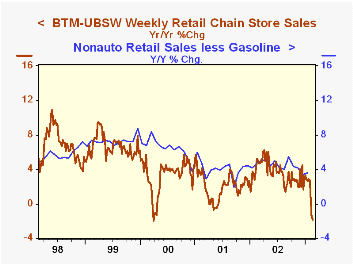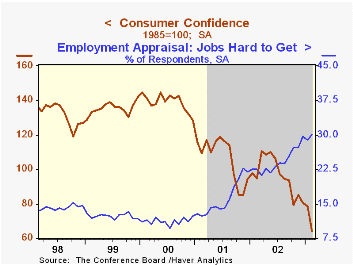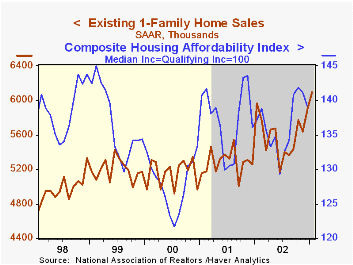 Global| Feb 25 2003
Global| Feb 25 2003Chain Store Sales Socked by Snowstorm
by:Tom Moeller
|in:Economy in Brief
Summary
Chain store sales dropped 0.8% last week according to the BTM-UBSW survey. This latest drop followed declines in two of the prior three weeks. The President's Day snowstorm which hit roughly half of the country likely accounted for [...]

Chain store sales dropped 0.8% last week according to the BTM-UBSW survey. This latest drop followed declines in two of the prior three weeks.
The President's Day snowstorm which hit roughly half of the country likely accounted for much of the weakness in sales last week. During the comparable snowstorm in 1996, weekly sales declines were sharper from a much firmer base.
February sales so far are down 0.6% from the January average.
During the last ten years there has been a 54% correlation between the year-to-year percent change in monthly chain store sales and the change in nonauto retail sales less gasoline.
| BTM-UBSW (SA, 1977=100) | 2/22/03 | 2/15/03 | Y/Y | 2002 | 2001 | 2000 |
|---|---|---|---|---|---|---|
| Total Weekly Retail Chain Store Sales | 405.2 | 408.3 | -1.9% | 3.6% | 2.1% | 3.4% |
by Tom Moeller February 25, 2003

The Conference Board’s Index of Consumer Confidence for February was much weaker than Consensus expectations for a reading of 77.0. January confidence was revised down slightly
The 18.8% m/m decline pulled Consumer Confidence to the lowest level since October 1993. The decline in Confidence was much greater than the decline in the mid-month Consumer Sentiment reading from the University of Michigan.
The decline in confidence reflected sharply lower readings of consumer expectations and of the present situation.
Expectations for general business and employment conditions in six months deteriorated to the lowest levels since 2001.
During the last ten years there has been an (inverse) 85% correlation between the y/y change in Consumer Confidence and the change in the appraisal of the job market (jobs hard to get).
The Conference Board's survey is conducted by a mailed questionnaire to 5,000 households and about 3,500 typically respond.
| Conference Board | Feb | Jan | Y/Y | 2002 | 2001 | 2000 |
|---|---|---|---|---|---|---|
| Consumer Confidence | 64.0 | 78.8 | -32.6% | 96.6 | 106.6 | 139.0 |
by Tom Moeller February 25, 2003

Sales of existing single family homes rose more than expected last month to another record level. Sales in December were revised up.
Home sales rose in January in each of the country's regions except the Midwest. Home sales in the Northeast rose 4.5% (-2.8% y/y). In the South sales rose 7.3% (5.5% y/y) and in the West sales rose 5.1% (3.1% y/y). Sales fell 7.5% in the Midwest (-2.4% y/y).
The median price of an existing home fell 1.2% in January to $160,400 (+6.7% y/y) from a downwardly revised December level.
The figures reflect closings of past home sales.
The average rate on a conventional 30-year mortgage fell last month to 5.92%.
| Existing Home Sales (000, AR) | Jan | Dec | Y/Y | 2002 | 2001 | 2000 |
|---|---|---|---|---|---|---|
| Existing Single-Family | 6,090 | 5,910 | 2.2% | 5,598 | 5,291 | 5,159 |
Tom Moeller
AuthorMore in Author Profile »Prior to joining Haver Analytics in 2000, Mr. Moeller worked as the Economist at Chancellor Capital Management from 1985 to 1999. There, he developed comprehensive economic forecasts and interpreted economic data for equity and fixed income portfolio managers. Also at Chancellor, Mr. Moeller worked as an equity analyst and was responsible for researching and rating companies in the economically sensitive automobile and housing industries for investment in Chancellor’s equity portfolio. Prior to joining Chancellor, Mr. Moeller was an Economist at Citibank from 1979 to 1984. He also analyzed pricing behavior in the metals industry for the Council on Wage and Price Stability in Washington, D.C. In 1999, Mr. Moeller received the award for most accurate forecast from the Forecasters' Club of New York. From 1990 to 1992 he was President of the New York Association for Business Economists. Mr. Moeller earned an M.B.A. in Finance from Fordham University, where he graduated in 1987. He holds a Bachelor of Arts in Economics from George Washington University.
More Economy in Brief
 Global| Feb 05 2026
Global| Feb 05 2026Charts of the Week: Balanced Policy, Resilient Data and AI Narratives
by:Andrew Cates






